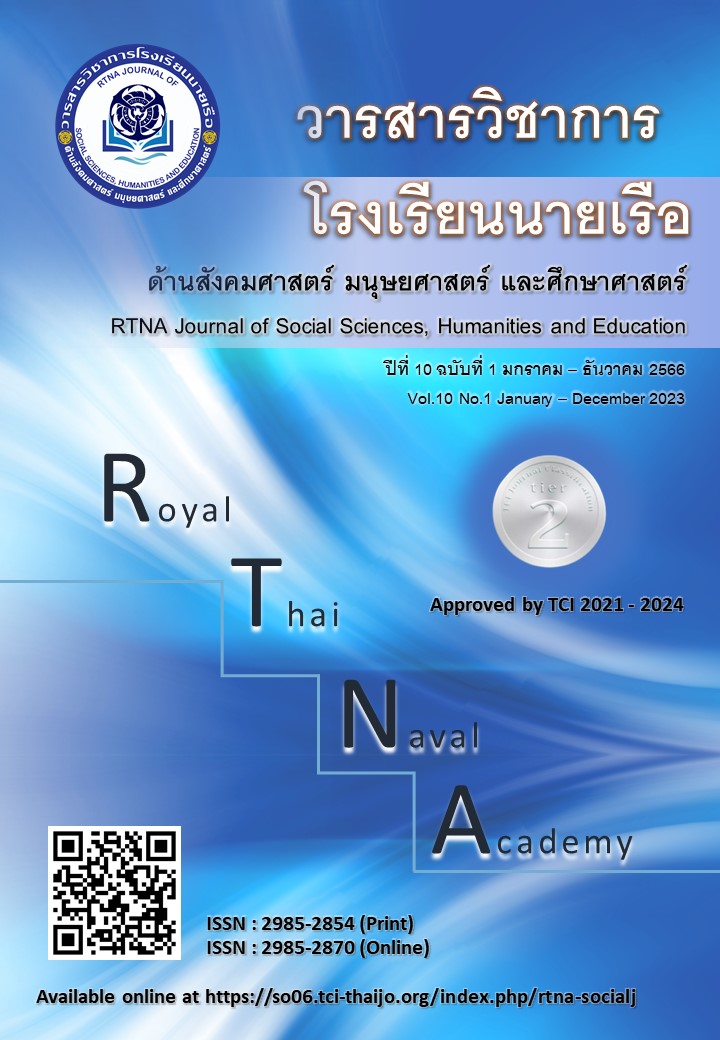Using Task- Based Learning/Teaching for the Development of Reading Comprehension of English-Chinese Students in Reading Strategies in English Course
คำสำคัญ:
Task-based learning, Course Learning Outcome, and Reading Strategies in English Courseบทคัดย่อ
This research aimed to evaluate the effectiveness of the students’ reading comprehension after using task-based learning and evaluate the students’ satisfaction with the teaching process at the end of the project. The samples of this study were 37 second year of English-Chinese major students studying Reading Strategies in English course from the Faculty of Liberal Arts, Huachiew Chalerm Prakiet University. The instruments were the reading activities, tasks, the pre-post reading comprehension tests, and course learning outcome questionnaires for investigating the satisfaction with the task-based teaching model. The data were analyzed statistically by percentages, mean, and standard deviation. The findings showed that the efficiency of the students’ reading comprehension was at a good level. The efficiency was ranged from the most effectiveness as identifying meaning of words, identifying organizational patterns of paragraphs and essays, identifying the topics, identifying supporting details, making inferences, summarizing and identifying main ideas, respectively. Regarding the course learning outcome, the students’ overall satisfaction towards the instructional model was at a high level.
เอกสารอ้างอิง
Carell, P.L. (1986). The effect of rhetorical organization and ESL.Reader. TESOL Quarterly, 18(3), 250-251.
Cooper, M. (1984). Linguistic competence of practiced and unpracticed nonnative readers of English. In J.C. Alderson & A.H. Urquhart (Eds.), Reading in a foreign language. (pp. 122-135). New York: Longman.
Ellis, R. (2004). Task-based language learning and teaching. Oxford: Oxford University Press.
Gagne, R. M. and Briggs, L. J. and Wager, W. W. (1992). Principles of Instructional Design. (4th ed.). New York: Holt, Rinchart and Winston.
Jiraporn Sangarun. (2004). Task-based Instruction should be implemented in Thai university English classroom. Nakhon Ratchasima: School of English, Suranaree University of Technology.
Krashen, S. (1985). The input hypothesis: issues and implications. New York: Longman.
Krashen, S. (2004). The power of reading. 2nd ed. Portsmouth: Heinemann.
Maythinee Kaikaew and Thanachart Lornklang. (2015). Using task-based learning focusing on Thai culture to promote. (Master’s degree in Teaching English as Foreign Language). Nakhon Ratchasima: Nakhon Ratchasima Rajabhat University.
Nunan, D., & Lockwood, J. (1991). The Australian English course: Task- based English for post-beginners. Cambridge: Cambridge University Press. Nunan, D. (1999). Second language teaching and lerning. New York: Heinle & Heinle.
Nunan, D. (2004). Task-Based language teaching. Cambridge: Cambridge University Press (http://dx.doi.org/10.1017/CBO9780511667336)
Office of the Education Council. (2014). Results of the achievement test (NT). Bangkok: Office of the Basic Education Commission, Ministry of Education.
Onpinya Ariyatanet. (2018). The development of secondary school students' English narrative writing skills through picture story description tasks. (Master of Arts Degree in English). Phayao: University of Phayao.
Sae- ong, U. (2010). The use of task-based learning and group work incorporating to develop English speaking ability of mathayom suksa 4 student. (Master’s thesis). Bangkok: Srinakharinwirot University. Retrieved from http://thesis.swu.ac.th/swuthesis/Tea_Eng_For_Lan(M.A.)/Uraiwan_S.pdf
Sheppard, K. & Stoller, F. (1995). Guidelines for the integration of student projects into ESP classrooms. Forum, 33(2), 10-22.
Skehan, P. (1996). A Framework for implementation of task-based Instruction. A lied linguistics, 17, 38-62.
Stoller, F. L. (1997). Project work: A means to promote language content. English Teaching Forum, 35(4).
Willis, D., & Willis, J. (2007). Doing Task-Based Teaching. Oxford: Oxford University Press.
Willis, J. (1996). A framework for task-based learning. Harlow: Longman.
ดาวน์โหลด
เผยแพร่แล้ว
ฉบับ
ประเภทบทความ
สัญญาอนุญาต
ลิขสิทธิ์ (c) 2023 โรงเรียนนายเรือ

อนุญาตภายใต้เงื่อนไข Creative Commons Attribution-NonCommercial-NoDerivatives 4.0 International License.
เนื้อหาและข้อมูลในบทความที่ลงตีพิมพ์ในวารสารวิชาการโรงเรียนนายเรือ ด้านสังคมศาสตร์ มนุษยศาสตร์ และ ศึกษาศาสตร์ ถือเป็นข้อคิดเห็นและความรับผิดชอบของผู้เขียนบทความโดยตรง ซึ่งกองบรรณาธิการวารสาร ไม่จำเป็นต้องเห็นด้วย หรือร่วมรับผิดชอบใด ๆ
บทความ ข้อมูล เนื้อหา รูปภาพ ฯลฯ ที่ได้รับการตีพิมพ์ในวารสารวิชาการโรงเรียนนายเรือ ด้านสังคมศาสตร์ มนุษยศาสตร์ และ ศึกษาศาสตร์ ถือเป็นลิขสิทธิ์ของโรงเรียนนายเรือ หากบุคคลหรือหน่วยงานใดต้องการนำทั้งหมดหรือส่วนหนึ่งส่วนใดไปเผยแพร่ต่อหรือเพื่อกระทำการใด ๆ จะต้องได้รับอนุญาตเป็นลายลักษณ์อักษร จากโรงเรียนนายเรือก่อนเท่านั้น






